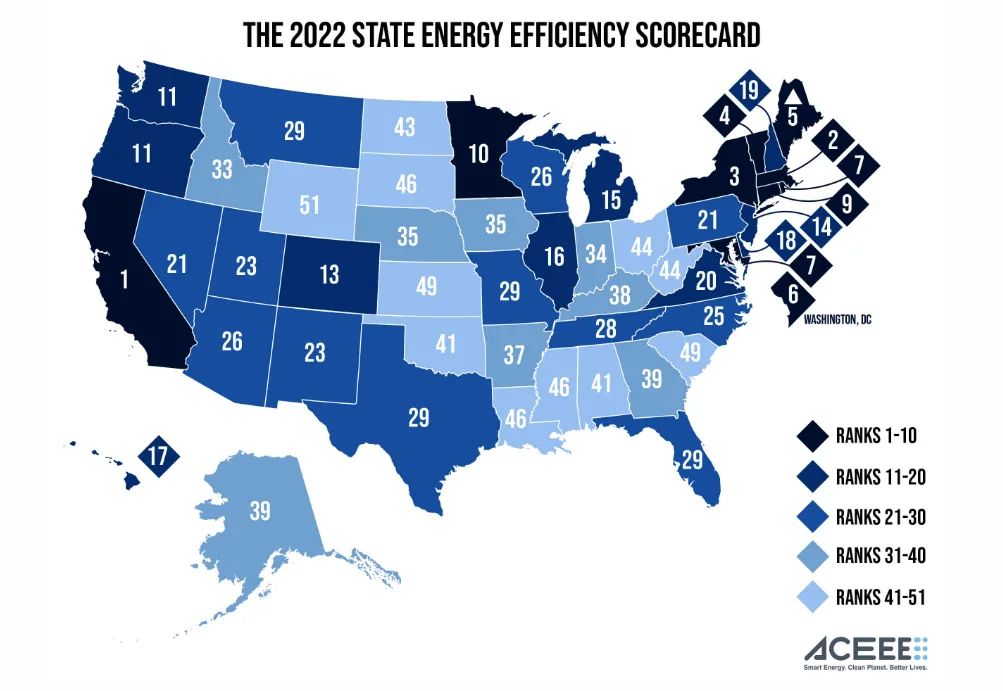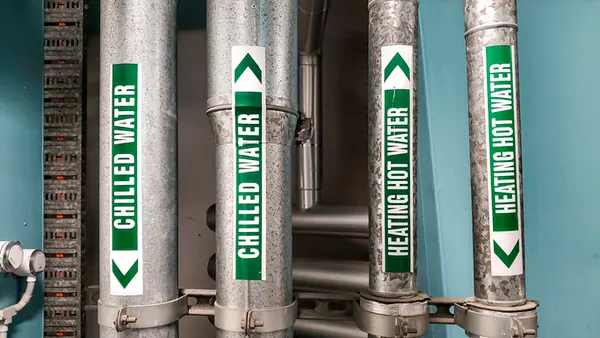Dive Brief:
- California once again sits atop the American Council for an Energy-Efficient Economy’s annual rankings of state energy efficiency efforts, scoring 47 out of a possible 50 points on the strength of its focus on equity and efforts to reduce emissions from the transportation, building, and industrial sectors.
- California topped the 2020 rankings also, and ACEEE held off on a 2021 assessment due to Covid-19. The group said it altered the scorecard methodology this year to expand its focus on equitable energy efficiency policies.
- Rounding out the top five spots this year were: Massachusetts, New York, Vermont and Maine. South Carolina lost the most ground, falling nine slots to 49th on the survey for allowing industries to opt out of efficiency programs and not incentivizing electrification. Wyoming again ranked last in ACEEE’s rankings, based on low energy savings targets and other policies.
Dive Insight:
The very top and bottom of ACEEE’s rankings look the same as they did in 2020, but that belies significant changes to the assessment’s methodology and shifts in state scores.
“A whopping 40 states lost points this year due to significant changes in the scoring methodology in several categories,” ACEEE said in its report. “Twenty-three states fell in the rankings due to factors including greater progress by other states and to scoring poorly on equity-related metrics across all policy areas.”
That movement “should be expected,” the group added, given the new metrics, including 12 equity metrics in the report representing 20% of total points available.

Among the metrics utility and public benefit program policy makes up 30% of the total points available on ACEEE’s scorecard, transportation policies account for 26%, and building energy efficiency policies for 24%.
“Leading states are shifting their efficiency efforts to focus on decarbonization and reducing energy burdens for the most vulnerable residents, setting an example for other states,” Sagarika Subramanian, senior research analyst at ACEEE and lead author of the report, said in a statement.
ACEEE’s assessment found “significant room for improvement,” given that 34 states earned less than half the available points related to equity policies. New equity metrics include: an examination of state efforts to strengthen community engagement, improve tracking of energy-equity-related data, and ensure equitable distribution of clean energy benefits.
Consumer advocates say the electric power sector is not taking sufficient action to address inherent inequities. Low-income customers have fallen behind on home energy bills to the tune of more than $16 billion as of August, and experts expect the issue will worsen this winter.
A broad range of energy efficiency policies and new rate structures are needed to address inequity in the power system, they say.
Maine was the most improved in ACEEE’s rankings, rising 11 spots to fifth based on new laws to incentivize electrification and decarbonization for affordable housing. Maine also continues to invest in weatherization and heat pump incentive programs, according to the report.
“South Carolina lost points for allowing industrial, manufacturing, and retail commercial customers to opt out of energy efficiency programs and for restricting energy efficiency funds from incentivizing beneficial electrification,” ACEEE said.
“In general, we see a few trends among states losing ground,” ACEEE said in its scorecard. “First, many of those falling behind are not increasing their energy savings annually and are therefore being outpaced as other states ramp up programs to meet higher savings targets.”
States losing ground also “typically have not fully implemented changes to the utility business model that encourage utilities to take full advantage of energy efficiency as a resource,” ACEEE said.
States near the bottom of the rankings “have not made much progress toward incorporating equity in state government planning and processes through dedicated equity task forces or toward setting energy burden reduction targets; they are also failing to dedicate resources toward healthy, affordable, and decarbonized housing,” the group concluded.
California maintained its top slot through a variety of policies, according to the report, including adopting rules to ban the sale of new combustion engine vehicles, prioritizing equitable decarbonization of buildings, and the development of tools to identify and prioritize investments in communities with disproportionate pollution.














